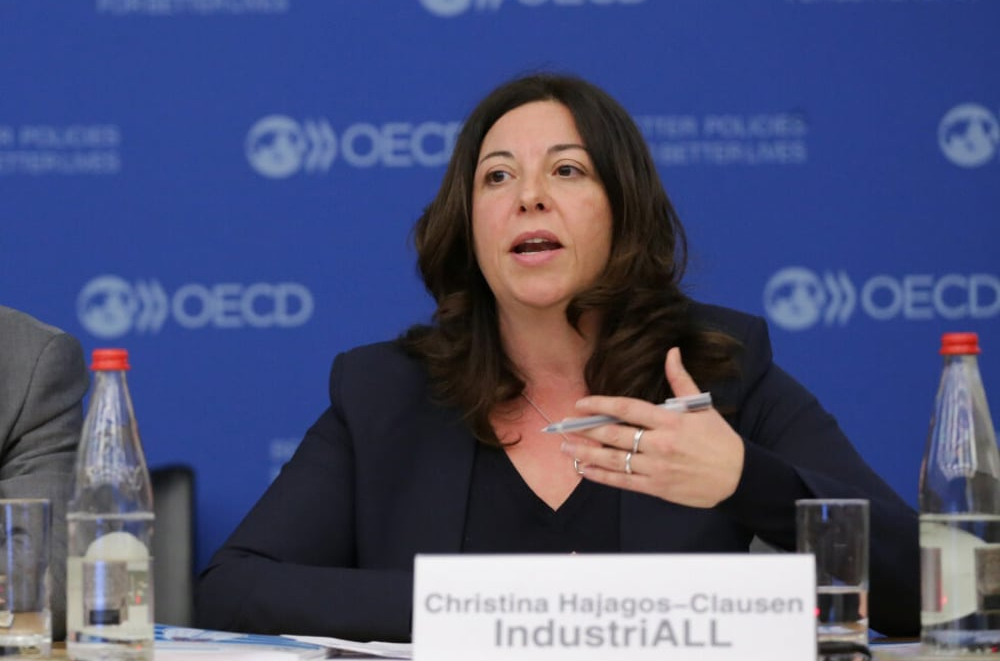IndustriAll's Christina Hajagos-Clausen Addresses Minimum Wage Challenges for Bangladeshi Textile Workers

Christina Hajagos-Clausen of IndustriAll discusses the escalating social tensions in Bangladesh regarding the revision of the minimum wage, particularly within the textile industry—the country's main sector. Despite improved factory safety measures, there has been an increase in trade union activities and alleged wage depression in the past year, according to Hajagos-Clausen, the Textile division head at the global trade union federation IndustriAll.
She notes that the recent wage-related protests in the Bangladeshi textile industry were unusually extensive. Hajagos-Clausen opines that the unrest results from the country's inflation, which has exacerbated the challenge posed by the country's low production costs, absence of sector-wide bargaining leverage, and wage erosion due to inflation. The outcome is that most textile workers remain impoverished.
She also interprets the stern response from the Prime Minister as an attempt to quell the unrest quickly. The government, according to Hajagos-Clausen, is trying to convince disgruntled workers to accept the wage increment and resume work. However, she believes that the protests would persist due to the workers' inability to meet their basic needs despite working for some of the most profitable brands.
Hajagos-Clausen believes there's still room for negotiation with the government. She rationalizes this stance by recalling similar incidents during the previous wage review session. Her perspective is that workers, across different categories, were unhappy with the tweaked wage hike, a decision that eventually forced the government back to the negotiation table.
On the BGMEA's appeal for brands to factor in wage increments during deals, Hajagos-Clausen notes that it's a significant, vast problem, requiring a new approach by brands. Although admitting that some brands are progressing in this area, she criticizes the majority for their lack of seriousness.
Any claim that such "social-washing" doesn't exist is false, according to Hajagos-Clausen. She emphasizes that IndustriAll's preferred solution to help workers is through industry-wide negotiations. Such negotiations would allow employees and workers to agree on wages beyond the minimum wage.
Addressing the state of Bangladesh's textile industry a decade after the Rana Plaza disaster, Hajagos-Clausen acknowledges that it's now safer for workers, with substantial investment from manufacturers. She punctuates her point by mentioning the International Agreement, a financially backed commitment by brands to ensure the safety of their production sites.
Hajagos-Clausen observes that Bangladesh has recently become more repressive. Over the past twelve months, the situation has become more challenging with an escalation in violence against trade union representatives and members. Yet, she appears surprised, considering the country's adherence to the International Labour Organisation's roadmap regarding trade union rights.
On why there has been a crackdown on unions over the past year, Hajagos-Clausen offers that maybe the industry's decision-makers do not want workers involved in specific decisions, which could potentially disrupt power structures. She also touches on the anti-union sentiment that results from company-level negotiations.
She does not believe that competition from other textile hubs in the Asia-Pacific region is a factor in the crackdown. She states that the minimum wage in China, the largest textile producer ahead of Bangladesh, is considerably higher. Hajagos-Clausen concludes by highlighting that wage depression in Bangladesh is an unfair practice considering brands are willing to pay more when ordering from neighbouring countries.




